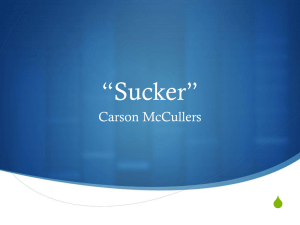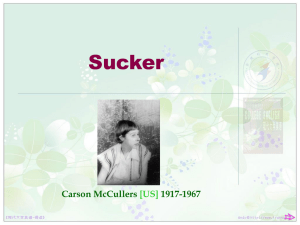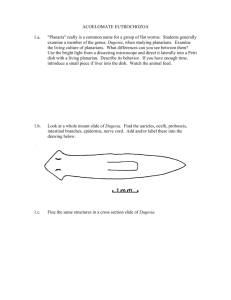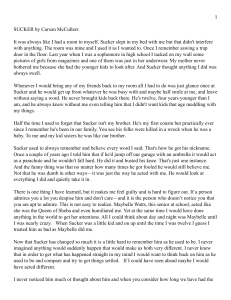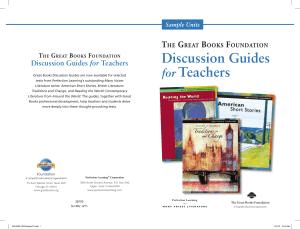Journal #3: Conflict
advertisement
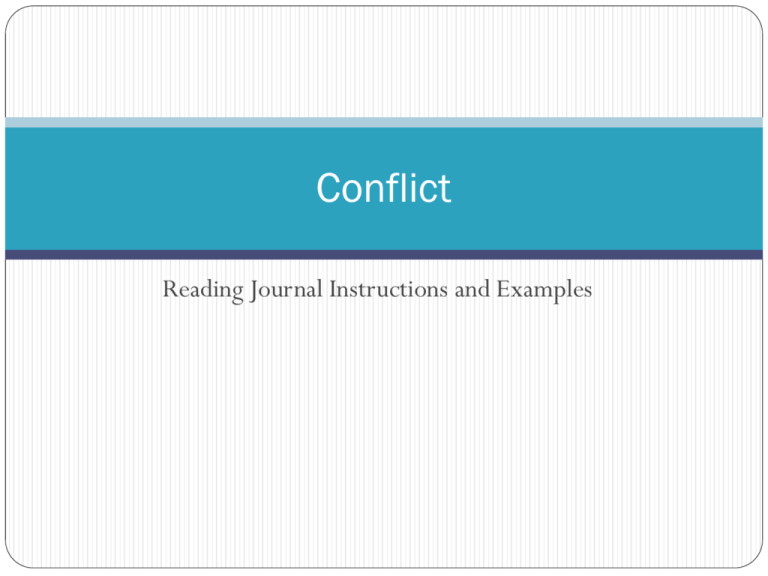
Conflict Reading Journal Instructions and Examples Opening Activity: Quick Review Answer the following questions in your comp book 1. What is characterization? 2. What is the difference between direct and indirect characterization? 3. What do the letters of S.T.E.A.L. stand for? 4. What is setting? 5. Bonus: What is conflict? Can you name some types of conflict? Objectives: By the end of the lesson, each student will be able to identify various types of conflicts in their reading response journals and determine how these conflicts are resolved. Responses will be evaluated using a standards-based rubric. CCS RL3: Analyze how particular lines of dialogue or incidents in the story propel the action, reveal aspects of a character, or provoke a decision. Types of Conflict, Overview Internal External A struggle that takes place in a A struggle between a character and an character's mind is called internal conflict. For example, a character may have to decide between right and wrong or between two solutions to a problem. Sometimes, a character must deal with his or her own mixed feelings or emotions. Person vs. Self outside force is an external conflict. Characters may face several types of outside forces. The outside force may be another character. It may be the character and the community. The outside force may also be forces of nature. For example, a story might be the main character struggling against the arctic cold. Person vs. Person Person vs. Nature Person vs. Society Person vs. _______ Internal Conflict A struggle that takes place in a character's mind is called internal conflict. For example, a character may have to decide between right and wrong or between two solutions to a problem. Sometimes, a character must deal with his or her own mixed feelings or emotions. Character vs. Self (traditionally referred to as man vs. self) Internal Conflict is … NOT a visual or tangible opposition. a character dealing with his or her own mixed feelings or emotions. Example: A character may have to decide between right and wrong or between two solutions to a problem. Examples from Literature Victor vs. himself as he struggles with his feelings of embarrassment in “Seventh Grade” Internal Conflict Quiz Question 1: Internal conflict is NOT: a. b. c. visible difficult serious Internal Conflict Quiz Question 2: An example of Internal Conflict is: a. b. c. Victor vs. Mr. Bueller Les Goodman vs. Charlie Victor dealing with his feelings of embarrassment Internal Conflict Quiz Question 3: Internal conflict is often referred to as: a. b. c. man vs. man man vs. himself man vs. external forces External Conflict Definition: A struggle between a character and an outside force is an external conflict. Characters may face several types of outside forces. The outside force may be another character. It may be the character and the community. The outside force may also be forces of nature. For example, a story might be the main character struggling against the arctic cold. External Conflict Examples The narrator from “Three Skeleton Key” vs. nature (the rats) Les Goodman vs. Charlie in “The Monsters are Due on Maple Street” Charlie vs. society (his neighbors/the mob) in “The Monsters are Due on Maple Street” Character vs. Character This is mostly seen in the form of two characters against each other. It can also be represented by a group of people. It does not have to be a physical confrontation; it can be a battle between two ideas. Victor vs. his Classmates ( also person vs. society) Character vs. Environment or Nature Environment is defined as anything surrounding a person. This can include weather, objects, activities. Basically anything external EXCEPT people. Example: Residents of Louisiana vs. Hurricane Isaac (the people are struggling to survive a storm, which is an outside force, nature) External Conflict Quiz Question 1: Which is NOT an example of external conflict? a. b. c. other characters forces of nature decisions External Conflict Quiz Question 2: One subcategory of external conflict is: a. b. c. man vs. man man vs. himself man vs. literature Conflict Notes: Please copy this chart into your notes •Internal Conflict •External Conflict •MAN VS. HIMSELF •MAN VS. MAN •MAN VS. ENVIRONMENT •*not tangible •*other characters •*any outside force •*in the mind •*not just physical confrontation •*anything in surroundings •*opposing ideas •*weather, objects, activities •*decisions, feelings, emotions Practice Identify the type of conflict in each of the following scenarios. Character (man) vs. character Character vs. nature Character vs. society Character vs. self In 1972 a seventh grade girl wants to take shop class in her middle school but is informed that she must take home economics because she is a girl. She pleads her case to her parents, several trusted teachers, her principal and two members of her local school board. Character vs. Character Character vs. Nature Character vs. Society Character vs. Himself While driving down a lonely country road, a young couple finds themselves lost in a sudden snowstorm. After missing their turn in the blinding swirl of flakes, they skid into a ditch and realize that they didn’t tell anyone where they were going. Mark and two of his friends are hanging out at the mall. Neil, a kid Mark isn’t always willing to trust, approaches the threesome and proposes a contest of sorts—one in which the winner is the person able to steal the most items from shops. He reassures the group that no one will get caught and the shop owners are all heavily insured anyway. Mark suddenly has a queasy feeling in his stomach and isn’t sure he wants to be part of the game. Ella has liked Mike since the two were in kindergarten together. They have always been friends—best friends, in fact—but lately Ella has realized that she doesn’t think of Mike as just a friend anymore. She wants something more from the relationship, but there is just one problem. Kyle. Kyle and Mike are friends as well, but Ella has never really liked Kyle and she is just as certain that Kyle doesn’t like her either. A scientist has struggled for years to find a cure for the disease that killed his father. Working alone at night, night after night, he has tried one combination after another, in hopes of developing a drug that might save his son. Practice Activity: Finding Conflicts in Picture Books Read the picture book that is on your table as a group. As you read, think about conflict. When you are finished reading, start by writing a one-sentence synopsis (summary) of the picture book you read. You may start like this: _____________ is about________ or use a more creative sentence structure. Discuss the conflicts in the story with your group. Select two conflicts from the book and answer the following questions for each: What type of conflict is it? Who is involved? What led to the conflict? How is this conflict resolved? In addition, find passages from the text that reveal this conflict. Be prepared to share. Conflict Journal Assessment Draw a line down the middle of the next available page of your composition book. Include these headings: Left Side: Text Right Side: Response Find a passage in your book that reveals a conflict. You may want to select a passage that shows more than one type of conflict (e.g. person vs. person and self). Write this on the left side. On the right side, answer the following questions in a wellwritten paragraph: What type of conflict is it? Who is involved? Explain and describe the conflict. What led to this conflict and how is it resolved? Conflict Journal Example Text Response “Now Henry had had his fill, that This passage is an example of a person vs. night he grumbled never will, live like the rest of them neat and the same, I am sorry I came” (from “Old Henry” by Joan W. Blos). society conflict; Henry vs. his neighbors. Henry’s neighbors want him to keep his yard as neat and clean as theirs, but Henry doesn’t like his yard that way and he does not want to conform to their wishes. In this passage, Henry expresses his regret for ever moving into this neighborhood where he is pressured to be something he’s not. To try to solve his problem, Henry moves away, but he ends up actually missing his home and his neighbors, so he decides to compromise and change to make everyone happy. He learns that sometimes it is necessary to work together to get along with others. Conflict Journal Example from “All the Years of Her Life” by Morley Callaghan Response Text “You’ve got a compact and a lipstick and at least two tubes of toothpaste in your pocket, Alfred.” “What do you mean? Do you think I’m crazy?” Alfred blustered. His face got red and he knew he looked fierce with indignation, but Sam Carr…only nodded his head a few times and then Alfred grew very tightened and he didn’t know what to say (Callaghan1). This passage demonstrates two types of conflict: character vs. character and character vs. self. Sam Carr has just caught his employee, Alfred, shoplifting from his store and is confronting him about it. When he asks Alfred to empty his pockets, Alfred responds with “fierce indignation,” which shows that he is angry and offended by Sam’s accusation, even though it is true. At first he tries to deny any wrongdoing, but Sam’s persistent stare and calm nodding makes Alfred so uneasy that he doesn’t “know what to say” and eventually empties his pockets, which resolves this external conflict. The internal conflict that Alfred is experiencing is also apparent in this passage. When Sam accuses him, his face gets reds and he “blusters,” which shows that he is struggling to justify his actions and is conflicted by his feelings of guilt and worried about getting caught. In fact, Alfred is so conflicted inside that he freezes up and can’t even speak. This conflict is never fully resolved, because even though his mother “rescues” his from any legal consequences, Alfred is left with the inner turmoil that comes with the realization that his poor decisions have taken an irreversible physical and emotional toll on his mother. This conflict reveals the theme of the story, which is that our actions don’t just affect us, they also affect those around us. Opening Activity Look through the story “Sucker” by Carson McCullers to look for conflicts Find one passage for each of the following: Character vs. Character Conflict Character vs. Self Conflict Write the passage For each passage, explain and describe the conflict Response: Journal Example Text “Why is it we aren’t buddies like we were before? Why--?... Why aren’t we buddies? Because you’re the dumbest slob I ever saw! Nobody cares anything about you! And just because I felt sorry for you sometimes and tried to act decent don’t think I give a darn about a dumb-bunny like you!” (“Sucker, 10) This is an example of a character vs. character conflict: Pete vs. Sucker. Sucker is asking why Pete has stopped being friendly toward him like he was before. When Pete was dating Maybelle, he felt like he was on top of the world, and his happiness spilled over into all aspects of his life, including his relationship with his younger cousin/brother. Now that Maybelle has dumped him, his depression and self-loathing has also spilled over to affect those around him. Because Sucker is always around, he bears the brunt of this verbal abuse as shown in this passage. This conflict is never really resolved. Both characters go on with their lives and pretend as if this confrontation had never occurred. However, at the end of the story, we learn that Pete is still very uneasy in his mind and has become scared of Sucker. And Sucker, has turned his hurt into anger and has built a wall of defense against Pete. Their relationship will never be the same. Plot/Conflict Journal Example Text: “And the thing is I just have to study because I’ve gotten three bad cards this term already… I don’t care a flip for Maybelle or any particular girl anymore and it’s only this thing between Sucker and me that is the trouble now (“Sucker” 12) Response: This is an example of an internal conflict that Pete is experiencing at the end of the story. In this passage, Pete is worrying about failing his classes because the situation with Sucker has caused him so much mental anguish. He can’t study or focus because he is worried about their relationship. This problem started when Maybelle dumped Pete. He was so angry and felt so rejected, that he unleashed his feelings on the person closest to him, his younger brother/cousin, Sucker. This conflict is never resolved because despite his effort, Pete never apologizes or attempts to make things right with Sucker.
